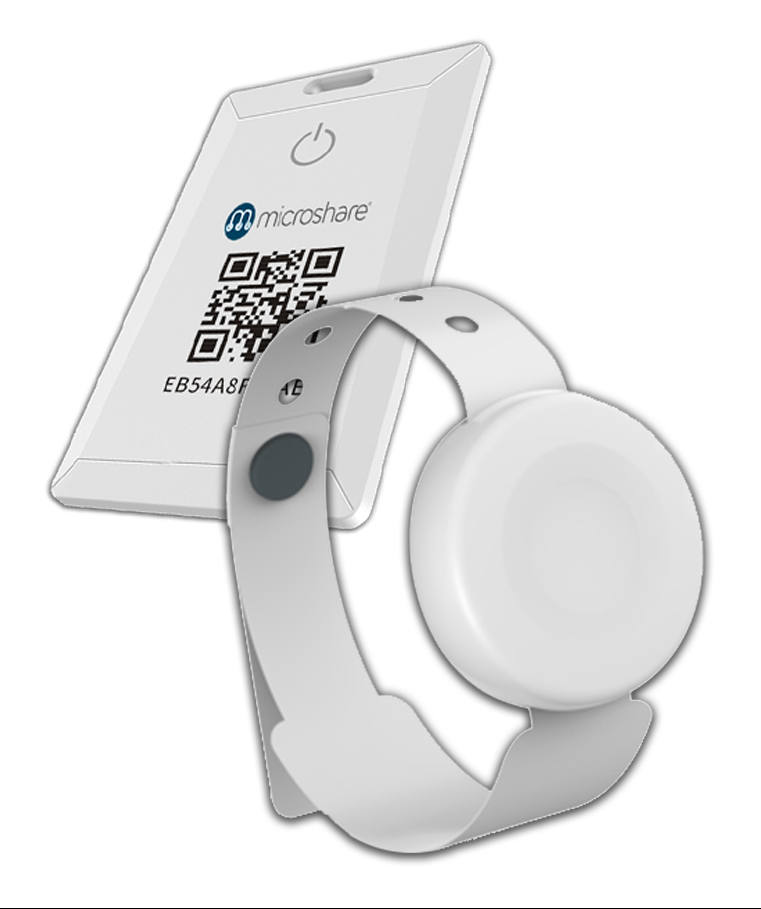by Brianna Crandall — May 25, 2020 — Smart facilities solutions provider Microshare has launched a Universal Contact Tracing solution that reportedly closes important loopholes and drawbacks in the smartphone-based approach under development by other companies. The solution was featured on the front page of the Financial Times on April 27, boosting global exposure for the Philadelphia-based company’s innovative products.
The FT, considered the world’s premier financial newspaper, noted that Microshare’s approach relies on inexpensive Bluetooth beacons in wristbands, nametags or keyrings, providing implicit consent on the part of those being traced, a controversial problem dogging the smartphone approach. Universal Contact Tracing, the newspaper said, is “a better alternative to the project that Google and Apple have devised based around using a smartphone’s Bluetooth signal.”

Microshare’s Universal contact tracing solution uses low-cost Bluetooth beacons in wristbands, nametags or keyrings, avoiding drawbacks in the smartphone-based approach. Image courtesy Microshare
The Microshare approach, which uses LoRaWAN low-power, wide-area gateways rather than expensive cell phone or global positioning system (GPS) data, will work in settings like factories, military barracks, on ships and in retirement homes where smartphone use is impractical or even forbidden. The smartphone approach also creates inequities in impoverished regions and among the elderly, and is vulnerable to individual users switching off their GPS or forgetting to carry their smartphones, or batteries simply dying.
Microshare Chief Risk and Sustainability Officer Michael Moran points out that a blind spot of the Apple/Google approach is that it assumes a universal adoption of smartphones. Moran remarked, “It’s just not true. And in fact, the most vulnerable populations in the world are exactly the ones that don’t have them.”
Microshare’s solution, subsequently covered by Fortune magazine, the Daily Mail, The Washington Post and others, is being deployed globally in the manufacturing facilities of a major pharmaceutical firm.
The Daily Mail article noted that “instead of relying on a smartphone, it gives employees Bluetooth-enabled key-rings, badges or wristbands to track their movements,” which brings an implicit consent into the picture. The smartphone approach has been criticized for its potential civil liberties implications.
The Microshare devices, the report continues, “record when they come into contact with another and upload the ‘encounters’ to a central database. This information is stored in a secure database that is searchable and auditable for historic patterns,” and the LoRaWAN-based network operates completely separate from sensitive corporate databases, reportedly posing a much lower cybersecurity threat.
Microshare CEO Ron Rock, in a series of interview with The New York Times, Fast Company magazine, and the impact and environmental, social and governance (ESG) investor platform Karma Impact, described the furious pace of innovation at the firm as one of the benefits of being “young, hungry, nimble, and stocked with very smart people who care about solving the world’s problems.”
The drawback to the Apple-Google project, and many of the rival services being developed, is that they rely on everyone carrying smartphones, Rock told Karma Impact. “Most people don’t have smartphones” in the developing world, and there are places in the developed world where they are forbidden or just impractical.
Microshare’s CEO, speaking with Fast Company, emphasized that there are locations, including workplaces, where cellphones aren’t permitted or are frequently left in lockers or cars, making them ineffective at tracking exposure. Building on the company’s existing Asset Zoning solution, which tracks the location of items such as hospital beds and wheelchairs, Microshare “developed Fitbit-style wearable Bluetooth devices. They can be used for workplace proximity tracing even where cellphones aren’t allowed. ‘We realized that tracking employees inside a building wasn’t dissimilar to tracking hospital beds,’ says Microshare cofounder and CEO Ron Rock.”
In South Asia, Analytics India Magazine — a kind of subcontinental version of WIRED — carried a report on the advantages of Microshare’s Bluetooth – LoRaWAN approach. Another Indian tech outlet, iMore, noted in its story that on Microshare’s approach that Universal Contact Tracing recognizes that smartphone-based contact tracing using apps “assumes the universal adoption of smartphones, which could in fact mean the most vulnerable groups in society are left out. … Microshare, is reportedly proposing the use of Bluetooth items like badges and wristbands to make contact tracing more effective.”
Microshare’s Universal Contact Tracing solution is available now for quick deployment across the globe.
To see a new product video explaining the technology, “Animation: How Universal Contact Tracing Works,” visit the company’s website.




